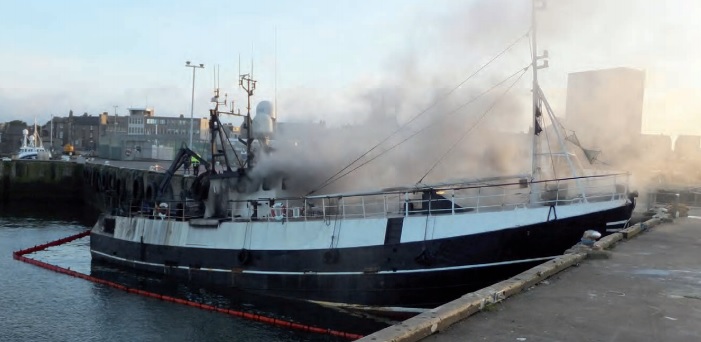In latest edition of its Safety Digest, the UK MAIB describes a case of fire in the crew mess room of a fishing vessel that was secured alongside in port. The three crew who were sleeping onboard escaped without injury, but the vessel was extensively damaged. The investigation identified that electrical failure was the key cause, but also revealed there was no smoke detector onboard.
The incident
The vessel’s machinery had been shut down and shore power connected, enabling the three crew to live onboard while the vessel was in port. The vessel was scheduled to conduct guardship duties the following week so the crew had been preparing for the inspection and various contractors had been onboard conducting repairs. The vessel’s engineer had also been onboard working in the engine room.
By 1800, the contractors had all left and the three crew who lived on board cooked a meal using a rice cooker in the crew mess room and a small oven in the galley. By 2345, all three crew were in bed, with the engineer still working in the engine room. He finished work and went home at approximately 0230, locking the door from the wheelhouse onto the upper deck as he left. All other doors and hatches were secured from the inside to prevent intruders.
At about 0515, one of the crew exited the accommodation and entered the crew mess room on his way to the toilet/washroom. He immediately became aware of the presence of black smoke and a smell of burning plastic. He alerted the other two crew, and all three then evacuated the vessel onto the quay. At 0537, with flames emitting from the vessel, the crew of another fishing vessel secured nearby called the emergency services.
At 0546, the first fire appliance was on scene and the fire service continued to tackle the blaze until the following day. By this time, the vessel was extensively damaged and it was later declared a constructive total loss.
Lessons Learned
- From examination of the fire patterns and other evidence, it was determined that the most likely source of the fire was an electrical multi-socket adapter, which supplied a domestic freezer in the crew mess room. Employers, who can include fishing vessel owners and skippers, have a responsibility to ensure electrical equipment is maintained in a safe condition. Regular visual inspection of electrical equipment to check for bare wires, that appropriate fuses are in place, and for signs of burning, together with regular Portable Appliance Testing, provides an effective means for reducing the risk of electrical fires.
- It was fortunate that one of the crew awoke and discovered the fire shortly after it had started. In the absence of a smoke detector in the crew mess room, this alerted the crew to the fire and triggered them to evacuate the vessel without delay. The nearest sensor to the probable source of the fire was a heat detector in the galley, which would not have activated until later, or possibly not at all if the fire door to the galley had been shut. Fires can start from various sources, and only by installing a comprehensive fire detection and alarm system – that covers all spaces that pose a risk – will a fishing vessel crew be confident of being alerted early enough to be able to take effective action.
- Crew living onboard a fishing vessel are exposed to particular risks, which must be considered and addressed by the owner. In addition to ensuring that a fire detection and alarm system remains energised while alongside, the issue of access to the vessel in an emergency is something that should be taken fully into account before allowing crew to live onboard.






























































